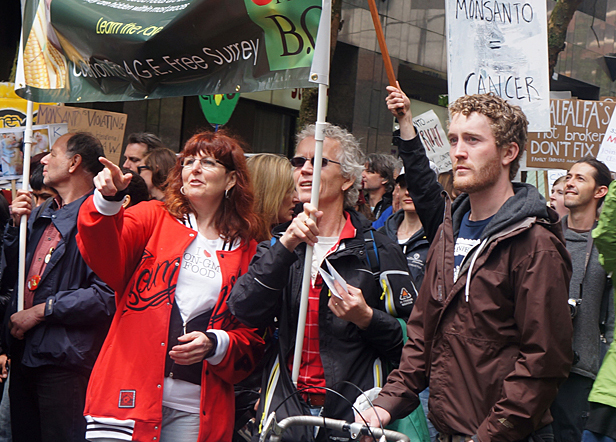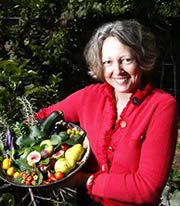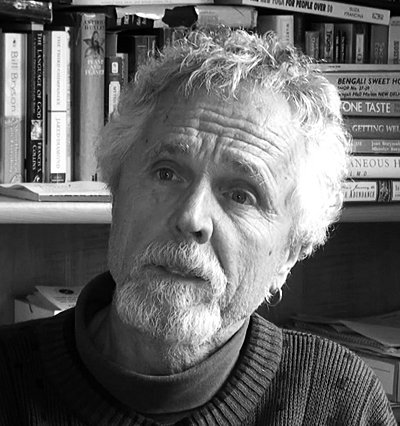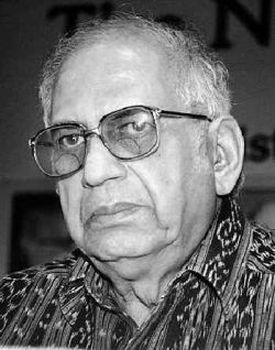There is a marked difference to the attitude of people across the atlantic, when it comes to acceptance of industrial chemicals into our food system, and Europe is providing to be more cautious than North America. The case of neonicotinoids insecticide is an example. The EU have imposed temporary ban on a few of these chemical, whereas there is no similar movement in the North American continent that I know of. This ban was based on a few high end research done on the effect of these insect nerve agents. There are many news articles from Europe that cover this story, as exampled here in the screen shot on the British news outlet – The Guardian. You can click on the image and go to the source.
One of the important scientific reports that was pivotal in EU reaching a decision to ban some neonicotinoids was done by Prof. Dave Goulson, currently with the University of Sussex in the UK. He was gracious enough to speak with me on phone for the purpose of this podcast.
Prof. Goulson studied Biology at Oxford University, and did a PhD on butterfly ecology at Oxford Brookes University. THen he served as a lecturer at University of Southampton for 11 years, where he specialized in bumblebee ecology and conservation. In 2006 he became Professor of Biology and Stirling University and in 2006, founded the Bumblebee Conservation Trust, a charity devoted to reversing bumblebee declines. In 2013 he moved to Sussex University.
Dr. Goulson has published over 200 scientific articles on the ecology of bees and other insects, and am author of “Bumblebees; their behaviour, ecology and conservation (2010, Oxford University Press)” and “A Sting in the Tale (2013, Jonathan Cape)”, a popular science book about bumblebees.
He is a Fellow of the Royal Entomological Society, and a Fellow of the Royal Society of Edinburgh. In 2010 I was BBSRC “Social Innovator of the Year” and in 2013 I won the Marsh Award for Conservation Biology from the Zoological Society of London. The conversation is presented here is just under 40 minutes long.
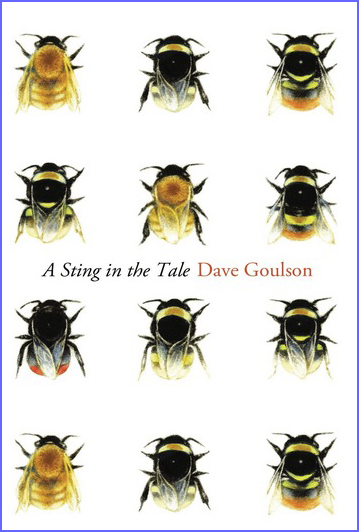 The most recent book that he wrote – A Sting in the Tale” (not tail), is available in north America as an e-book for Amazon kindle or Apple iPad as well as in hardcover. I have downloaded the first few pages of the book in my iPad as a sample, and intend to buy the full book, from what I read already. The book promises to be a good science book on the bees but with a humorous tone that attempts to keep the uninitiated reader glued to the tale, and an essential read for those concerned about ecology and sustainability the natural plant world around us and its intimate and complicated relationship with insects, and other small organisms.
The most recent book that he wrote – A Sting in the Tale” (not tail), is available in north America as an e-book for Amazon kindle or Apple iPad as well as in hardcover. I have downloaded the first few pages of the book in my iPad as a sample, and intend to buy the full book, from what I read already. The book promises to be a good science book on the bees but with a humorous tone that attempts to keep the uninitiated reader glued to the tale, and an essential read for those concerned about ecology and sustainability the natural plant world around us and its intimate and complicated relationship with insects, and other small organisms.
The 40 minute conversation is converted here as a podcast. You can listen to it directly by clicking the play button at the bottom this page.

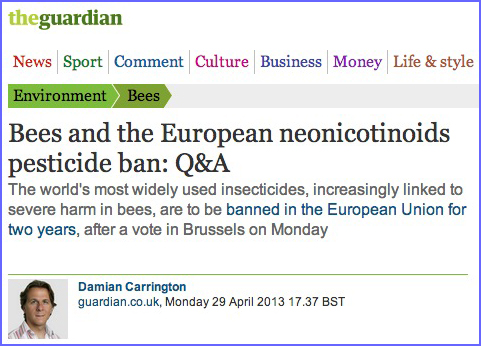
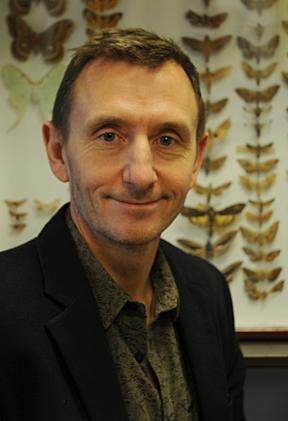




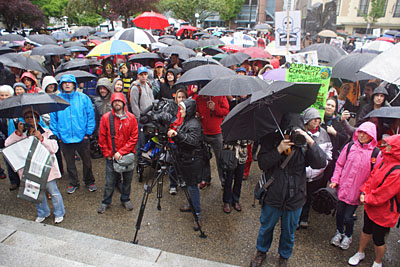 In a strong and unflinching voice, she started the gathered crowd going, raising the level of passion till the protesters matched her in full throated cry – hell no Monsanto, we don’t want your GMO.
In a strong and unflinching voice, she started the gathered crowd going, raising the level of passion till the protesters matched her in full throated cry – hell no Monsanto, we don’t want your GMO.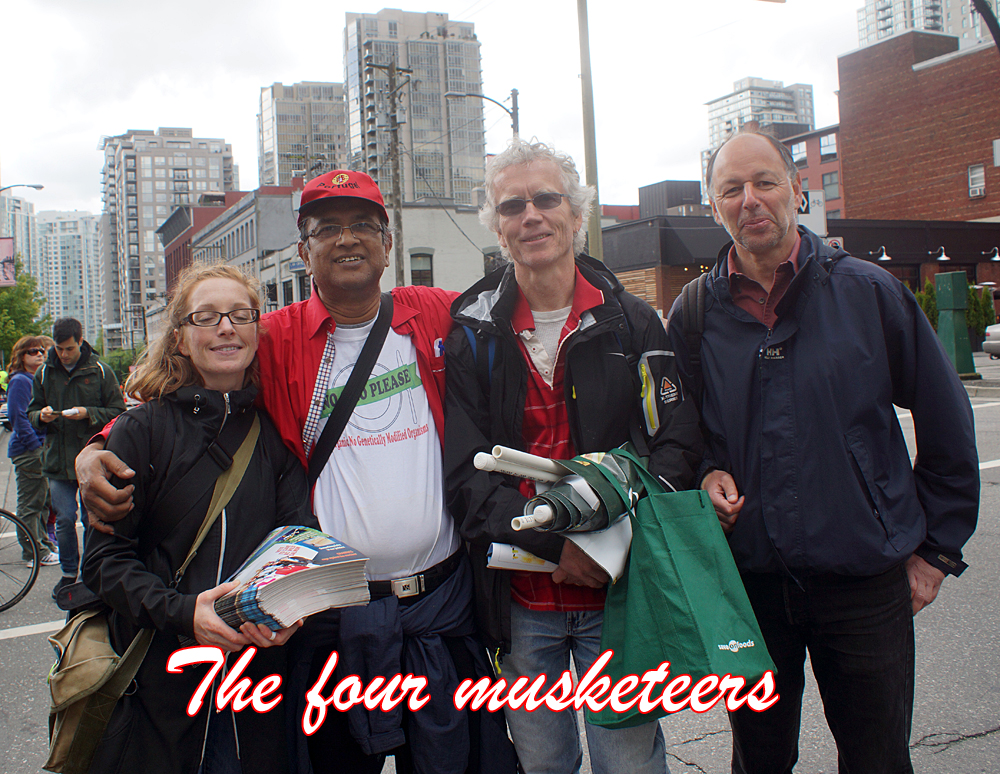 At the end point of the march, at BC place, we finally got the mini-group picture – of the four musketeers that joined hands with the thousands in Vancouver and millions around the world, to bring down the evil empire. Thats pocket dynamo and march coordinator super volunteer, Laura (NoEnbridge) Yates, with Tony (citizen journalist) Mitra, Phil (leading GE free Surrey) Harrison and Tony (leading GE free Vancouver) Beck.
At the end point of the march, at BC place, we finally got the mini-group picture – of the four musketeers that joined hands with the thousands in Vancouver and millions around the world, to bring down the evil empire. Thats pocket dynamo and march coordinator super volunteer, Laura (NoEnbridge) Yates, with Tony (citizen journalist) Mitra, Phil (leading GE free Surrey) Harrison and Tony (leading GE free Vancouver) Beck.